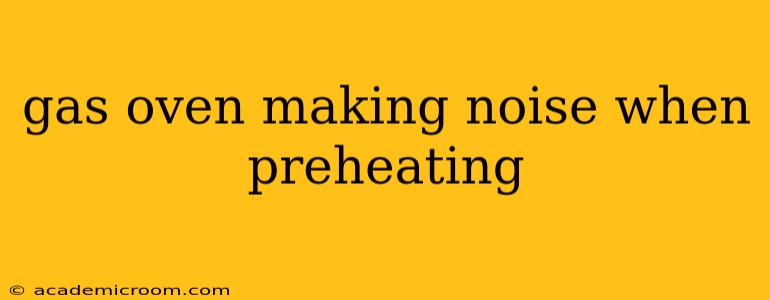Is your gas oven making unusual noises during preheating? This is a common problem that can range from a minor annoyance to a sign of a more serious issue. Understanding the source of the noise is crucial for resolving the problem and preventing further damage. This comprehensive guide will help you diagnose and fix the sounds your gas oven is making when it preheats.
Why is My Gas Oven Making Noise When Preheating?
Several factors can cause a gas oven to make noise during preheating. These noises can vary in type and intensity, providing clues to the underlying cause. The most common culprits include:
- Igniter Clicking: This is often a normal sound, particularly in older ovens. The igniter creates a spark to light the gas burner. A clicking sound indicates the igniter is working, but the gas may not be flowing properly.
- Gas Burner Sounds: The gas burner itself might create various noises, including whooshing, whistling, or humming. This is often due to airflow, gas pressure, or debris in the burner ports.
- Blower Motor Noise: The oven's fan, responsible for circulating hot air, can create humming, whirring, or rattling sounds. These sounds might intensify during preheating as the motor works harder.
- Expansion and Contraction: As the oven heats up, metal components expand and contract. This can cause popping or clicking sounds, which are typically harmless but can be unsettling.
- Loose Components: Loose screws, parts rattling against each other, or components that aren't properly secured can cause various knocking or clanging noises.
What are the Common Noises a Gas Oven Makes?
Let's delve into the specific types of noises and their potential causes:
1. Clicking Noise:
A consistent clicking sound is usually the igniter attempting to light the burner. This may indicate a problem with the gas supply, the igniter itself, or the thermocouple (a safety device that cuts off gas if the flame goes out). If the clicking persists without the burner igniting, you may need to call a qualified gas appliance repair technician.
2. Whooshing or Whistling Noise:
These noises often originate from the gas burner. A whistling sound can be caused by a partially blocked burner port, while whooshing might indicate uneven gas flow. Check the burner ports for any debris or obstructions. If the problem persists, professional assistance might be required.
3. Humming or Whirring Noise:
A humming or whirring sound usually indicates a problem with the blower motor. This can be due to wear and tear, bearing issues, or even something lodged in the fan blades. If the noise is excessive or accompanied by vibrations, contact a repair technician.
4. Popping or Clicking Noise:
These sounds are frequently related to the thermal expansion and contraction of metal components as the oven heats up. These noises are usually harmless but can be loud.
5. Rattling or Knocking Noise:
A rattling or knocking sound typically points towards loose parts inside the oven. Check for any loose screws, trays, or other components that might be rattling against each other during operation. Tightening loose screws can often resolve this.
How Can I Fix the Noise My Gas Oven Is Making?
Addressing oven noises requires a systematic approach:
-
Safety First: Always disconnect the oven's power supply before attempting any repairs. Never attempt to repair gas-related components yourself unless you are a qualified technician.
-
Inspect the Burner: Carefully examine the gas burner for any debris, obstructions, or damaged ports. Clean the burner with a soft brush or compressed air.
-
Check for Loose Components: Inspect the oven's interior for any loose screws, trays, or other parts that might be rattling. Tighten any loose screws you find.
-
Assess the Blower Motor: Listen closely to pinpoint whether the noise originates from the blower motor. If you suspect a problem with the blower motor, professional help is recommended.
-
Gas Supply and Igniter: If you are experiencing issues with the igniter or suspect a problem with the gas supply, do not attempt to fix this yourself. A gas leak can be extremely dangerous, so contact a qualified gas appliance repair technician immediately.
When Should I Call a Professional?
If you're uncomfortable attempting any repairs, or if the noise persists after checking for loose parts and cleaning the burner, it's best to call a qualified gas appliance repair technician. This is particularly important if you suspect a gas leak or a problem with the igniter or blower motor.
By systematically investigating the source of the noise and following the troubleshooting steps outlined above, you can often identify and resolve the issue. Remember, safety is paramount. If you are uncertain about any aspect of the repair, don't hesitate to contact a professional.
